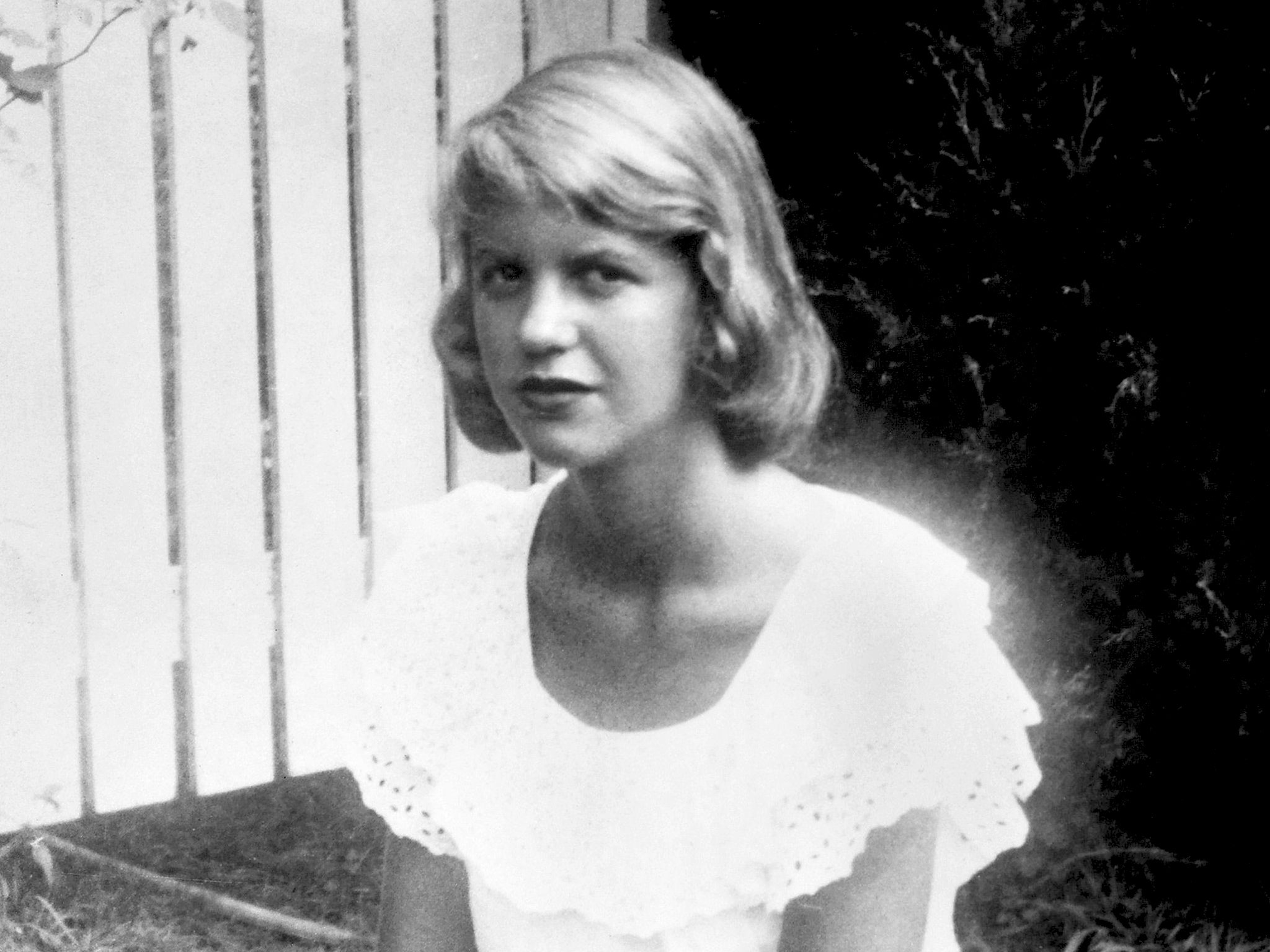I worship Sylvia Plath and cry when I listen to Phoebe Bridgers: I’m a ‘sad girl’ cliché and I’m proud of it
I have a poster of ‘The Bell Jar’ on the wall and a tattoo of an anatomical heart on my sleeve, writes Victoria Richards. Call me tragic if you like, but being a ‘sad girl’ brings me joy...


Every year, I make a pilgrimage to Sylvia Plath’s grave in Heptonstall with a close friend. We take pens to leave at her headstone and we sit in the grass and sometimes we write poems of our own.
Amelia and I talk constantly about love and loss, send each other first drafts of writing projects and ask questions that probably sound achingly earnest (but we mean it): “How is your heart?” Most nights, we sign off goodnight texts with the closing lines of a poem by one of our favourites, Kim Addonizio: “Joy is coming”.
We’re sad girls. And we’re proud of it.
Sad girls occupy that liminal space where sorrow meets bliss, where happiness means suffering, where desire tiptoes towards pain. One of my all-time favourite films? Eternal Sunshine of the Spotless Mind, in which Kate Winslet plays Clementine, a rainbow-haired sad girl (the trope itself is “manic pixie dream girl” adjacent) who signs up to have her memory erased after a devastating break-up. And now, after seeing the full-length trailer for the new Barbie movie, with its standout line, “Do you guys ever think about dying?” I feel vindicated: Barbie, it transpires, is a sad girl. Of course she is.
Teen angst, existential woe, unrequited love, forbidden romance, alternative music, definitely not being a cheerleader – the characteristics of the sad girl read like the blueprint for any high school TV script through the ages, from Winona Ryder in Heathers to Mary Elizabeth Winstead in Scott Pilgrim vs The World. Even Carrie.
And who could be more sad girl than Marianne in Sally Rooney’s Normal People? It doesn’t surprise me that I adored both the book and BBC adaptation, because I find myself constantly seeking out stories that rise and fall on romantic waves of yearning, beautifully told by writers like Deborah Levy, Meg Mason, Anne Carson and Anne Sexton. Sad girls, you see, seek out other sad girls to join an unspoken sad girl club.
I am a walking ode to being emo – and proud of it. “Sad girl summer”, apparently, was last year – but for me it’s all year round (though it’s a heady mix of “goth girl summer” too. Real sad girls, darling, always wear black). I grew up listening to metal, haunted MySpace, have dyed my hair black since I was 14 and wear industrial-strength eyeliner that stayed on, incredibly, even during childbirth.
I have a poster of Plath’s The Bell Jar on the wall of my “writing room” (which is painted a dark blue-black, of course). A tattoo of an anatomical heart on my sleeve. If it is no longer eyes that are the windows to the soul, but Spotify playlists, then mine mark me out by title alone: from “Soaring heart-crushers” to, “Rip my heart out and eat it”, to “Teenage crush”, to “Machine Gun Kelly gave Megan Fox a thorned engagement ring and I want one” (Phoebe Bridgers, naturally, features prominently).
I also have one called, “Ted & Sylvia met at a party, she bit his cheek” – in tribute to their infamous, epic, toxic romance. If you have the weighty Letters of Sylvia Plath Volume I: 1940–1956, and Volume II: 1956–1963 on your bookshelf, like I do, you’ll remember her account of the night they met: Plath walked into a crowded literary party and was drawn to a “big, dark, hunky boy”, who she later discovered to be Hughes.
The pair were immediately attracted to each other and on going into a private room, as she recounted in her journal the next day: “I was stamping and he was stamping on the floor, and then he kissed me bang smash on the mouth and ripped my hairband off. . . . And when he kissed my neck I bit him long and hard on the cheek, and when we came out of the room, blood was running down his face.” Could there be anything sexier?
Ted and Sylvia, Megan Fox and Machine Gun Kelly: sad girls are invariably drawn to dark or doomed romance, to brooding lovers in leather jackets. The thing about having your heart broken, though, is that you feel so alive. I do all the things we sad girls do best: writing poems, eating pizza in the bath and crying over episodes of Grey’s Anatomy (the “will they? won’t they?” love affair between Meredith and McDreamy is sad girl catnip).
For me, being a sad girl means being in touch with the way I feel (and feeling it all). It means embracing joy as much as sadness and not having to pretend that I’m someone I’m not; it is being completely, irrevocably “myself”. As a result, my friendships are deeper than ever, my relationships more connected. I’m not afraid to say “I love you”. I’m not embarrassed to admit when I’m not coping. It’s no joke that my colleagues say I’ve entered my “brutal honesty era”.
Yet on the flipside, being “open” isn’t always a blessing – it can also be a curse. As Plath once wrote in her little-known radio play, Three Women: “It is a terrible thing to be so open: it is as if my heart put on a face and walked into the world.” It can leave you vulnerable to being wounded. It can enhance – or stifle – conversation. It can increase intimacy, or scare someone off. Being (or being around) a sad girl isn’t for everyone.
There is also negativity associated with the sad girl trope. One accusation – and it’s a fair one – is that we pay undue attention to the sad white girl; that similarly “emo” women of colour are woefully under-represented. Netflix hits like Never Have I Ever or To All the Boys I’ve Loved Before, which feature a diverse array of sad girls, go some way to redressing the balance – but there’s always more work to be done.
And when it comes to worshipping Plath herself, as I do – well, some critics say that’s problematic; that her personal issues – and her tragic, well-documented death – are grossly glamourised. They argue that to fail to separate the legacy of her life’s work from her depression is akin to romanticising mental illness. Some say that buying in to the sad girl narrative risks undermining people’s suffering.
I see it differently: rather than glorifying tristesse, I think that a frank approach to grief and to feeling blue – and being honest about it – might just be life-changing.
After all, we live in a world in which we (particularly men) tend to bottle up our emotions. Studies tell us that in 2021, the rate of suicides among males in the UK was 16 per 100,000 population, and among females it was 5.4 per 100,000. And, according to the Priory group, men are traditionally far less likely to seek support for mental health issues for a number of reasons including stigma and the traditional “strong male” stereotype still prevalent in our society – the idea that “expressing emotion is a sign of weakness”. Now, imagine if they were just a little more “sad boy”?
Still: sad girl or sad boy, if you are one, you’ll know it. Take heart. Joy is coming.
Victoria Richards’ short story collection, Sylvia Plath Watches Us Sleep... But We Don’t Mind is out now from Fly On The Wall Press





